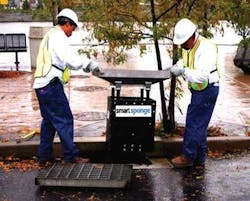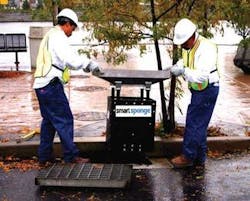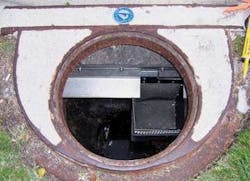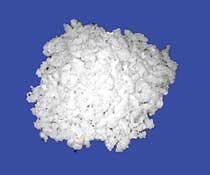Filtration Technology Protects Waterways, Provides Advanced Monitoring
by Judy Shane
Over a decade ago, many local officials were charged with meeting stringent environmental regulations to protect waterways from stormwater runoff — the culprit of water pollution. Today, cities and counties are continuing to search for cost-effective methods of protecting local beaches from stormwater runoff while facing budget cuts, rapid growth, and constant change.
Smart Sponge® technology — a filtration material that blocks pollutants such as bacteria and hydrocarbons from entering recreational beaches and waterways — has been demonstrated as one viable solution for protecting water from pollutants. In addition, its unique properties allow for tracking systems, which can help municipalities meet monitoring requirements and identify water pollution sources.
Filter Project
In January 2008, the city of Norwalk, CT, reported its findings on a stormwater filter project using Smart Sponge technology that is aimed at preventing oil, grease, hydrocarbons, trash, and bacteria from entering Long Island Sound. The study showed that the equivalent of 1,200 gallons of oil and 19 tons of trash were captured by the filtration systems installed in 275 key storm drains in south Norwalk (see Fig. 1).
"We've been searching for over a decade for a cost-effective method of stormwater treatment to protect Norwalk Harbor and Long Island Sound," said Norwalk Mayor Richard A. Moccia. "The results speak for themselves."
"The Soundkeeper Organization was not only delighted with the results of the pilot and how the project has impacted the health and utility of the Long Island Sound but is extremely pleased to be working with such a forward thinking [community]," said executive director of the Soundkeepers, Terry Backer.
Sen. Joseph Lieberman (D-CT) was instrumental in getting the program funded through the U.S. Environmental Protection Agency, making the Norwalk filtration project the largest federally funded program of its kind.
"I'm excited about the leading role that Connecticut has taken to protect our beautiful Sound from stormwater pollution," Lieberman said.
Protecting Florida Waterways
Miami, Florida, was recently recognized as number one on the Forbes.com list of America's Cleanest Cities — due in part to Smart Sponge filters installed in storm drains adjacent to city hall (see Fig. 2). In another part of the state, a grease spill from a Key West local restaurant was captured by a filtration system installed in stormwater drains on the street, preventing gallons of grease from entering the nearby offshore reef community and coastal waters.
Operations Management International (OMI) conducted the grease spill clean-up and reported that four gallons of pollutants were captured in the Smart Sponge® Plus filters located in the storm drain adjacent to the source of the grease spill on Duval Street.
"The Duval Street stormwater system is heavily impacted by tourists and recreational activities that leave excessive trash and debris on our streets, sidewalks and storm drains," said Annalise Mannix, environmental programs manager for the city of Key West. "It was only a matter of time before an accident of this nature was bound to occur and impact our waterways. We are so grateful that the...system was in place to proactively limit any pollutants and toxins from entering our near shore waters."
Airport Applications
In addition to municipalities, airports around the country, such as Westchester County Airport in New York, have installed Smart Sponge filters in catch basins to protect surrounding waterways and minimize the environmental impacts of stormwater runoff. This filter program is a significant part of Westchester County's Airport Environmental Management System (AEMS). The airport is one of only three in the United States that have earned the ISO 14001 Standard.
Vault Systems
The Smart Sponge's flexibility makes it ideal for vault applications at the end of a pipe. One large-scale installation was built for Tesco, an 88-acre food-processing facility in Riverside, California. This vault application holds 7,000 pounds of Smart Sponge and is designed to remove hydrocarbons and harmful bacteria on contact. The application is also used in areas experiencing significant influent loads of sediment and debris.
What is it?
Smart Sponge technology, invented and developed by AbTech Industries, is a water filtration media based on a combination of polymer technologies chemically selective to hydrocarbons (see Fig. 3). Smart Sponge technology is also available with an antimicrobial agent to block bacteria and other health-threatening microorganisms from contaminating waterways.
Glenn Rink, AbTech's president and CEO, first began his work with polymer technology for agricultural applications. However, after becoming aware of the critical environmental challenges threatening waterways, he saw more wide-reaching applications. As a result, the company has spent over seven years and $16 million developing Smart Sponge technology.
Rink explained that its unique characteristics offer advantages over traditional environmental products.
"It is called "smart" because after it absorbs hydrocarbons, such as oil and grease, it will not release them under any amount of pressure," he said.
Once pollutants are absorbed, the Smart Sponge transforms them into a stable solid suited for simplified disposal or recycling.
"This, combined with the product's closed-loop solution, its flexibility, ease of use, and cost effectiveness, allowed us to develop a variety of customized products for water pollution prevention," Rink said.
AbTech's Ultra-Urban® Filter, for example, is a modular filtration unit or catch basin filter that is currently used at the entrance of storm drain systems. The filters are designed in various shapes and sizes depending on the size of the drain and can be used for either curb-opening or top-down storm drains. The filter, which is made of recycled corrugated plastic and contains the Smart Sponge, removes contaminants from the water as it flows through the storm drains.
Filters containing the Smart Sponge can be replaced when the unit reaches saturation. Depending on the type of location — residential, commercial, or industrial — the replacement time frame is one to four years. One of the findings reported in the Norwalk filter project was the ease of maintenance and installation.
"We found [in Norwalk] that when these catch basins needed to be cleaned, three men could clean 275 of them in two days. Without the sponge, it might take a month," said Terry Backer, executive director of the Soundkeeper.
The U.S. EPA has included AbTech's Ultra-Urban Filter series with Smart Sponge technology as a Best Management Practice (BMP) under the federal guidelines.
Antimicrobial Agent
AbTech Industries holds a U.S. patent on the Smart Sponge Plus, the only non-toxic, fully recyclable filtration system that destroys bacteria at the street level.
"With Smart Sponge Plus, we now offer cities, stormwater professionals, and industrial entities an opportunity they have never had before — to destroy dangerous disease-causing microorganisms, such as Staphylococcus aureus, E. coli, and fecal coliforms," Rink said.
Rodolfo Manzone, Ph.D., AbTech's executive vice president and chief technology officer, explained that the system employs an antimicrobial agent, chemically bound to the polymer filtration material, which deactivates health-threatening microorganisms without releasing chemicals or leaching.
Advanced Monitoring
Test results on multiple applications of Smart Sponge technology continue to provide insights for optimum treatment systems for future installations. In addition, the media's ability to capture and retain hydrocarbons and other contaminants within its highly porous structure allows for a new level of analyses that can provide useful tracking data for municipalities or industries required to meet stringent monitoring regulations.
While coarse contaminants, such as trash and debris, are easily collected and measured, other contaminants (e.g., fine sediment, oil and grease, suspended heavy metals) can be more difficult to quantify using traditional monitoring methods. Smart Sponge's unique composition, which traps contaminants inside the filters, allows for a more advanced approach to quantify and identify contaminants. This process uses analytical techniques to deconstruct the polymer media and selectively extract all the entrapped contaminants collected over the project's duration.
This type of advanced analysis could have widespread ramifications to help municipalities and industries quantify and classify contaminants. The benefits are numerous — meeting monitoring and tracking requirements, detecting illicit discharges and evaluating which types of treatment systems are most effective under varying conditions.
About the Author:
J. Shane is an environmental writer and lecturer in UCLA's Civil and Environmental Engineering Department.



